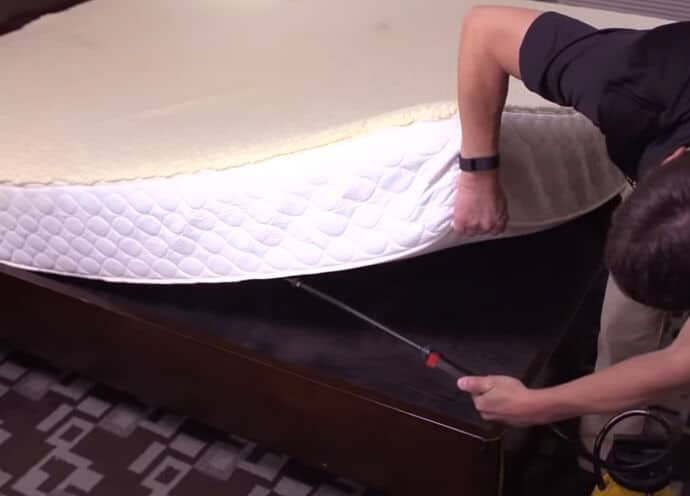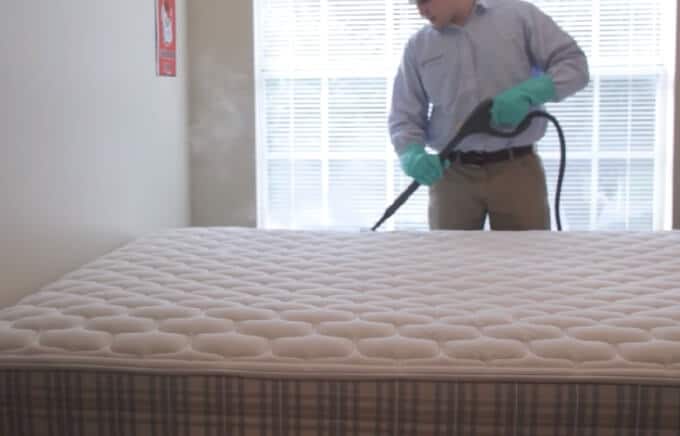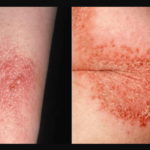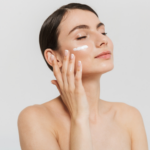There are different ways to prevent bed bugs and their bites, but is there something you can put on your skin? What can you put on your skin to prevent bed bug bites?
To prevent bed bug bites, put any of the following essential oils on your skin: tea tree oil, eucalyptus, peppermint, lavender, clove, cinnamon, or lemongrass. These oils deter and prevent bed bugs and their bites.
Many people don’t want to have bug repellant chemicals on their skin, so they usually go for repellents with natural ingredients, specifically those made from essential oils. These are botanical products and smell pleasant to humans, but bugs hate these scents.
Still, there are those who only use sprays or bug repellents intended for surfaces like clothes, bed sheets, blankets, pillows, closets, and things where these bugs might try to hang around in – instead of putting anything on their skin.
Read on to learn more about what to put on the skin to prevent bed bug bites and some great remedies for your bed bug problem.
Also, for an excellent essential oil for preventing bed bug bites, take a look at the Healing Solutions Organic Tea Tree Essential Oil (100% Pure – USDA Certified Organic):
Click here to see it on Amazon.
What to Put on the Skin to Prevent Bed Bug Bites?
Tea tree oil can be put on your skin to prevent bed bug bites. Essential oils such as tea tree, eucalyptus, peppermint, and lavender, will deter and prevent bed bugs. Bed bugs do not like the scent of these oils, as these oils can affect their exoskeleton.
Essential oils are the alternative that you can put on your skin to prevent bed bug bites. Not only are they safe because they are natural ingredients in themselves, but the scents of these oils are, more often than not, friendly on the nose.
Essential oils that act as natural bed bug bite repellents come in the form of tea tree oil, eucalyptus, peppermint, lavender, clove, cinnamon, or lemongrass.
Use a pure, unrefined tea tree oil like the Healing Solutions Organic Tea Tree Essential Oil:
The solvent properties of tea tree oil suffocate bed bugs if they come in contact with it. They will avoid anything that is scented with tea tree oil.
Click here to see it on Amazon.
Other skincare companies have also come up with bed-bug-repellent lotions or creams that are purported to also contain any one of these or a combination of these essential oils. Make it a habit to check the label before getting yourself a bottle or a jar.
If you’re the type who has ultra-sensitive skin and would want to refrain from putting anything on it, then you may want to use an essential oil mixed with a carrier oil (such as coconut, olive, jojoba, or sweet almond) where you can dilute it, especially if you find such essential oil quite strong.
Other Ways to Prevent Bed Bugs

While using essential oils on your skin might be the safest way to prevent bugs from feeding on your blood, there are other things that you can do to avoid bed bugs or a serious infestation, aside from using repellents:
- Professional exterminator – seeking help from a professional exterminator is very important for a severe infestation or even if you see a few bed bugs (as may indicate there are other bed bugs hiding somewhere). These companies have options for you to choose from depending on your needs.
- Put items like clothes, bedding, stuffed toys in the dryer and turn on high heat – bed bugs hiding in these places can be targeted as bed bugs cannot survive in high temperatures.
- Steam – same as the principle behind the dryer, heat from steam can kill the bugs. This is effective for bugs found in your clothes, furniture, cracks, carpets, and baseboards
- Hydrogen peroxide such as bleach can eliminate bed bugs, but they will likely discolor or ruin the surface of your carpet, beddings, furniture, etc.
- Stay away from clutter and wash your bedding regularly. Let newly washed bedding dry thoroughly before using or keeping them.
- Vacuum around the bed to target stray bugs and eggs.
- Spray around the headboard, bed-frame, and nearby furniture using non-toxic bug spray. Check the label first to check if the spray is safe for use indoors.
- Mattress encasements cover your mattress to trap bed bugs until they starve and die. However, they might stay elsewhere in your room (e.g. furniture) so you have to keep the other areas clean and clutter-free to avoid infestation.
Do bear in mind, though, that these repellents are NOT to be used on the skin but in places, bed bugs could be hiding.
Risks Involved in Bed Bug Repellents
We’ve said earlier how it’s important for you to read the label before getting a bed bug repellent from your local store. Here, we’ll tell you about the risks involved in using repellents, especially sprays that usually contain some chemical formulations:
- Depending on what the active ingredients are, spray repellents, may, at the very least, stain or ruin fabrics (of clothes and beddings) or wooden surfaces (such as furniture and baseboards).
- Sprays with toxic or harsh compounds may irritate your skin or trigger allergies so test them first using a very small amount on your inner forearm.
- Even essential oils or formulations with essential oils as their active ingredients may still pose some risks if your skin is sensitive or prone to allergies. If this is the case, then be sure to add water/dilute them to lessen the chances of irritation.
How Often Do Bed Bugs Bite?
To understand what you’re up against, it’s better to know the feeding (a.k.a. biting) habits of bed bugs. In this way, you will learn to be more cautious and observant of their habits.
These miniature insects attack while you’re asleep and leave small red patches on the skin after feeding on you. But here are some interesting things to also remember:
- Bed bugs feed solely on blood.
- It usually takes them 3-10 minutes to feed on prey, piercing the skin many times and making a zigzag or cluster pattern on the bite area.
- They eat anytime between each of their five nymphal stages as they develop into adulthood.
- If ‘food’ is plenty to come by, they can feed once a week.
- Bed bugs can go without food for 3-5 months in normal room temperature, and more than a year in optimal temperature and humidity (usually in structured lab conditions)

Home Treatment for Bed Bug Bites
We’ve already told you that bed bugs usually feed on people’s blood while they’re asleep and that these tiny insects finish off by leaving small red patches (e.g., swellings) on the skin areas they have bitten on.
Though their bite doesn’t hurt (because of an anesthetic substance in their saliva), when you wake up, you’ll find the bite marks itchy.
So when that bed bug repellent did not seem to have worked, how do you treat the bite marks? Quite simple, really.
Provided that there are no signs of a serious reaction or infection, you can follow these steps:
- Using a gentle soap and clean water, wash the affected area to help reduce the itchiness.
- Apply a very mild, over-the-counter corticosteroid cream to the bite area. You can buy it from a drugstore. Stronger formulations require a prescription.
- If the itchiness really becomes unbearable, just give the area a few gentle taps with your palm using a clean cloth to lessen the itch before applying anything.
You might be comforted with the knowledge that your bed bug bites should be gone within a week or two, provided that you don’t do anything to get them infected. See a dermatologist if the bite marks do not change after this or if they worsen in appearance, become painful, or if you suspect an infection.
Conclusion: What to Put on the Skin to Prevent Bed Bug Bites?
Tea tree oil can be put on your skin to prevent bed bug bites. Essential oils such as tea tree, eucalyptus, peppermint, and lavender, will deter and prevent bed bugs. Bed bugs do not like the scent of these oils, as these oils can affect their exoskeleton.
While it’s easy to just pick up any product over-the-counter that says ‘insect repellent’ or maybe ‘bed bug repellent,’ know that it’s better to be safe than sorry. And to do this, we strongly recommend that you go for natural ingredients.
Look for essential oils which you can put on your skin to prevent bed bug bites. Typically, these are tea tree oil, eucalyptus, peppermint, lavender, clove, cinnamon, or lemongrass. And for those with very sensitive skin, choose the ones mixed with carrier oils like coconut, olive, jojoba, or sweet almond.
Bed bugs don’t bite that often, but when they do, the experience can be rather unpleasant. Hence, you can pay attention to other preventive measures like spraying your bedroom and beddings, for example, with repellents that are safe but effective enough.
Related reading:
Do Bed Bug Bites Spread When Scratched?
How Long Do Bug Bites Last on Skin?



![Say Goodbye To Wrinkles On The Face [Easy Tips to Prevent Them] wrinkles on face](https://skincaregeeks.com/wp-content/uploads/2023/04/wrinkles-on-face-1-2-150x150.png)
![Neutral Skin Tone Defined [and Best Colors for Neutral Skin] neutral skin tone](https://skincaregeeks.com/wp-content/uploads/2021/05/neutral-skin-tone-150x150.png)





![Read more about the article Hot Spoon Mosquito Bite Treatment [Does It Help and How To]](https://skincaregeeks.com/wp-content/uploads/2021/05/hot-spoon-mosquito-bite-300x200.jpg)
